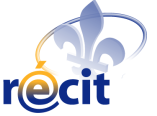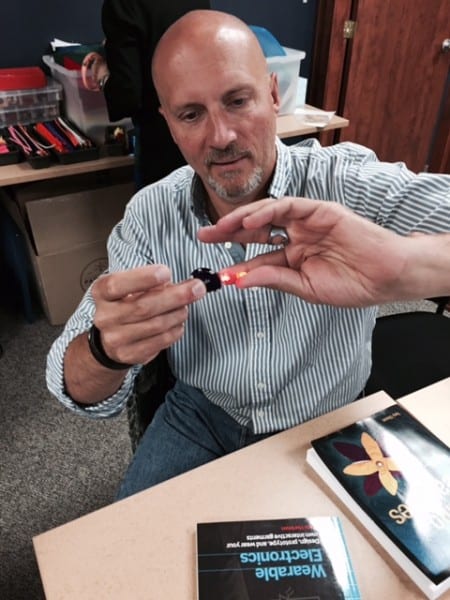Over the years I have had the privilege of working with the various local RÉCIT consultants and have always been impressed by their depth of knowledge and commitment.
For a bit of historical background, the RÉCIT was founded in 2000 with the mandate to support and develop the use of information and communication technologies. The emphasis is on pedagogy and how ICT can best enrich teaching and learning.
There are two levels of RÉCIT: the national and the local. For the Anglophone sector, part of LEARN’s mandate is to serve as the national RÉCIT. It is with this hat that LEARN provides many resources about the integration and uses of technology in the classroom. LEARN consultants work with their counterparts in the French National RÉCIT to develop materials and, in some cases to translate materials that were developed for the French sector.
Are you using Cartograf? Paul Rombough worked closely with Steve Quirion of the RÉCIT National – Univers social to develop this tool.
A great example of sharing via translation is the LES on creating Manga. Ben Loomer wrote about this project earlier this year in his blog post The Story of Manga: Do something like this but better.
LEARN also works closely with the local RÉCIT. While every board, as well as Adult services and Vocational Education has a person responsible for the RÉCIT dossier, in many cases this does not make up the total of his/her job. Despite that, I marvel at what they are able to accomplish. They are the ones dealing with the grass roots, the teachers who rely on them to support their use of technology both for themselves and their students, as well as to introduce them to new ways that technology can impact their students’ learning. They are the ones making sure that the deployment of new technology goes smoothly. They work hard to keep abreast of new developments in educational technology, constantly learning to see what fits in with their clientele (makerspaces, robotics, blogs, using tablets, new apps…).
Did you know?
- The RÉCIT consultants often work together to design and present workshops at conferences such as QPAT, LEARN events, LCEEQ…
- The RÉCIT consultants share what they learn with each other and with you through their board portals.
- Some of the RÉCIT consultants maintain Pinterest boards to share with their teachers.
- Avi Spector’s (Adult Ed RÉCIT) blog, Beyond the Tools http://beyondthetools.com/, is full of great ideas about teaching with technology.
Not sure who your local RÉCIT is? Just look here for those working at the K-11 level http://learnquebec.ca/en/content/recit/local.html and here for those working at the provincial level http://learnquebec.ca/en/content/recit/recit_list.html .
While it is good to know whom to turn to for help, it is also important to be clear on the kind of help you want.
When using technology with your class, think about –
- What do I want my students to accomplish / learn?
- Will the use of technology make what the students are learning more meaningful? Deeper?
- What technology will best suit what I want my students to accomplish?
- Will technology help me differentiate learning for my students?
- Or just ask: Would technology help in this LES?
Your RÉCIT consultant can better serve you when you start with pedagogy – what are you teaching and why. They may have the answers on how technology can serve that purpose and deepen the learning for your students. They will also know the possibilities and limitations of technology both in terms of access and new developments.
Additional Links:
- Private Sector RÉCIT http://learnquebec.ca/en/content/recit/recit_list2.html
- National RÉCIT http://recit.qc.ca/
- Service national RÉCIT Domaine des Arts http://www.recitarts.ca/
- RÉCIT National Univers Social http://www.recitus.qc.ca/
- RÉCIT Domaine des langues
- (in English – particularly for ESL) http://www.domainelangues.qc.ca/en/
- En français http://www.domainelangues.qc.ca/fr/
- Service national du RÉCIT Mathématique, Science et Technologie http://recitmst.qc.ca/
- Service national du RÉCIT au développement de la personne http://www.recitdp.qc.ca/
- Service national du RÉCIT en adaptation scolaire http://www.recitadaptscol.qc.ca/
- Service national du RÉCIT à l’éducation préscholaire http://recitpresco.qc.ca/
- Service national du RÉCIT à la FGA http://www.recitfga.qc.ca/index.htm
- General Adult Education http://www.recitfga.qc.ca/english/
- Cartograf – http://cartograf.learnquebec.ca/HomePage
- LES on creating Manga – http://learnquebec.ca/en/content/curriculum/languages/ela/resources/manga.html






There is also a RÉCIT for Vocational Education (RÉCIT-VT), please visit our new blog at recit-vt.blogspot.ca
Tami
Thanks for adding this, Tami
The RECIT is a good example of the power of networking! Long life to the RECIT!
Another great example of collaboration with our RECIT colleagues can be seen in LEARN Preschool Education section. The RECIT Préscolaire were the first to develop Robotics in Kindergarten in French and it’s now available for the English sector also.
Thanks Susan, for the bringing all those resources into one concise article.
Hey LEARN Quebec and RECIT folks!…Thank you for the “Maker-Space” experience last month. I continue to be in awe of your collective brilliance, and inspired by your individual contributions to learning. You are doing amazing work. Let’s share it with the entire province and beyond.
Just thought I would elaborate the places where Eastern Shores School Board resources can be found.
We use Pinterest to share classroom resources with teachers. There are various boards for all subjects and topics. You can find those at https://www.pinterest.com/recitessb
The IT’s@ESSB blog is where you can find resources, hear about ESSB classroom projects, and simply celebrate learning. You can find that at http://blogdev.learnquebec.ca/itsatessb
You can also connect with ESSB events and learning opportunities on Twitter. Our handle is @RECIT4ESSB